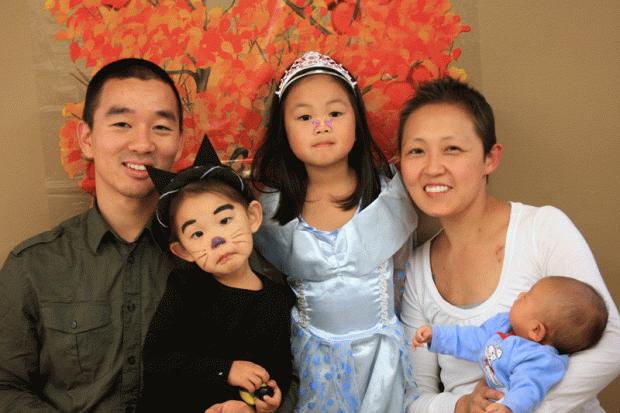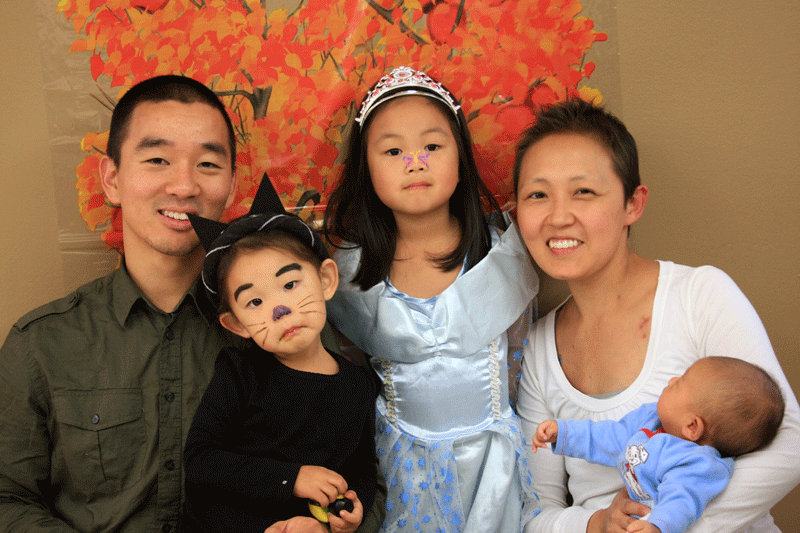I have much to be thankful for this year. January will mark five years since my wife’s breast cancer surgery, after which her chances of recurrence drop significantly. Thinking back to the frightening months following my wife's initial diagnosis, I remember that many doubts and questions dominated my mind. But no question was more paralyzing and difficult to answer than this one, as well as its myriad variations: “Why me, God?”
"God, why did you let my wife get sick with breast cancer? Did we do something wrong? What had we done to deserve this?”
“God, why did you let my church plant close down? Am I a terrible pastor, a failure?"
"God, why have I been unemployed for so long? How am I going to provide for my family, how am I going to afford insurance in case my wife gets sick again?"
"Why God? Why me?"
"God, why did you let my wife get sick with breast cancer? Did we do something wrong? What had we done to deserve this?”
These are questions that every person asks themselves at some point in their lives. But what sets these questions apart are that they are not just personal but theological in nature, and so lay bare our understanding of self, of God, and of life. As I spent days and nights wrestling with the question, “Why me?” I discovered that two slightly different variations of that question helped transform my lament into thanksgiving. The first question was this:
"Why not me?"
In some way, when I asked the question, "Why me?" there was an assumption that suffering was not supposed to affect me, that it was not appropriate or fair. The entire question that I was asking God was, "God, why me? This kind of thing is not supposed to happen to someone like me. Other people perhaps, but not me."
But the real question is why not me? God had never promised that I would sidestep suffering, that my wife would forever remain healthy, or that I would succeed as a pastor. In fact, Jesus repeatedly calls upon the disciples to count the cost of following him, to recognize that they will be hated by others, to bear crosses, and even die to self. Moreover, many others have lived far better lives than I and have still experienced tremendous difficulty. Just ask Jesus, or the apostle Paul, or Corrie ten Boom, or Martin Luther King Jr. If such faithful servants of Christ could suffer so profoundly, why not me?
The question "Why me?" betrayed the fact that I had bought into a worldview that is based more on karma than the gospel. Part of the reason why hardship shocked me is because I had bought into the American dream, where everyone gets what they deserve, rather than the grace that is through Christ, which is that everyone does not get what they deserve.
The question "Why me?" betrayed the fact that I had bought into a worldview that is based more on karma than the gospel.
In truth, I am just as susceptible to the difficulties and hardships and grief that accompany human existence as the next person. I’m no better, no more worthy of a free pass based on virtue or intelligence or character—or my identity as a follower of Christ. But this also meant that my hardships were in no way an indicator that God did not love me or had abandoned me for all time. I realized that people who are deeply loved by God can suffer deeply as well—and that included my family and me.
The second question that I asked myself was even more transformative than the first:
"Why me?"
This might seem like the same question that I first posed, so allow me to explain what I mean: When I experience hardship, I am often quick to raise an anguished voice to the heavens and cry out, "God, why me?! Why, out of all people, have I been chosen to suffer in this way?" And when I fail to receive a satisfactory answer – or any response at all – that can only mean that God does not love me, or he doesn’t exist. In fact, many of us probably know people who have lost their faith in this exact manner.
Yet when something good happens to me, when I experience blessedness and providence and protection, I rarely do the same thing, or at least not to the same degree. I don’t raise a shout to the heavens, "God, why me?! Why, out of all people, have I been chosen to receive this blessing and this goodness in my life? Why God, whyyyy?" Instead, I give quiet praise to God as I wear a smile of smug self-satisfaction, certain that my own intelligence and righteousness had something to do with the outcome.
I find that rather revealing, that when I am doing badly, I am quick to complain to God, to pin my misfortunes on him and his incomprehensible ways. But when I am doing well, I am more quiet and reserved. What an unfair contradiction, that God should be so commonly blamed for my hardship, and so anemically praised for my blessings! By all rights, if I am shaking my fists at the heavens, I should also be prepared to raise my hands to them as well. This is only logical and fair.
What an unfair contradiction, that God should be so commonly blamed for my hardship, and so anemically praised for my blessings!
And so as my wife began her treatments, I began to ask this same question but in a different way, asking what I had done to deserve the blessings of my life. I looked at my wife and daughters and had no idea why God had saw fit to give me with such a wonderful family. I witnessed the love and care of my brothers and sisters in Christ who stood by our side and I marveled, knowing that I had done nothing to deserve such constant friends. These and many other blessings surrounded me on a daily basis. I had done nothing to deserve these gifts, and yet here they were, richly piled at my feet. I had been so focused on what I lacked that I had been all but blind to all that I possessed.
As we give thanks, we inevitably come to the realization that we are undeservedly, richly, and bewilderingly blessed.
What I learned through this it that thanksgiving is more than just a holiday, but a crucial spiritual discipline that we must cultivate daily. Our selfish sinful nature takes an open-ended question like “Why me?” but only asks it as a means to question God and to count all that we lack in life. But thanksgiving stands as a bulwark against this tendency. Gratitude brings balance to our lives, reminding us to always look for blessings, even when we find ourselves in what we think is a barren wasteland. And as we give thanks, we inevitably come to the realization that we are undeservedly, richly, and bewilderingly blessed.
So this Thanksgiving holiday, I encourage you to ask “Why me, God?” But not as a means to complain about what you lack, but as a way to marvel at all that you possess but never earned. Perhaps then you will realize as I did: that though you thought you were a pauper, you are actually the richest person in the world.
 Peter Chin/Rights Reserved
Peter Chin/Rights Reserved









